- Home
- Chris Wraight
Vaults of Terra: The Carrion Throne Page 18
Vaults of Terra: The Carrion Throne Read online
Page 18
There was little to learn. Rassilo’s agents had uncovered much the same information as they had – the False Angel’s exact location was unknown, but he was operating in the underhives. He would lead them out of darkness, they said, against the forces that oppressed them, for the authorities cared nothing for the travails of the weak and the sick. They always denied responsibility for the flesh-breaking, claiming other hands had been at fault – at least until the tools were applied and the truth began to flow. Some repented fully under scrutiny; others remained defiant, repudiating the worship of the Emperor and all His works. Those were the ones whose torment was prolonged. As she read the accounts, Spinoza found herself nodding in approval at the expert work of the truth-finders.
By the time she turned to the papers forwarded to her by Crowl, the chronos showed that the day was waning. With every passing hour her impatience to be doing grew, and she almost pushed them aside in favour of assembling her kill-team right away and leaving the citadel. With some reluctance, she reached for the topmost sheaf, and started to read. Huk had been diligent, and the material was artfully arranged. Halfway down the second folio, she suddenly halted. She read it again. Then, only then, she reached for her comm-bead.
‘Sergeant, ensure your squad is assembled for immediate dispatch,’ she commanded. ‘I will be with you shortly.’
She placed the vellum sheaves back in their leather pouches, all except the last one, which she rolled tight and took with her. Then she reached for her combat-helm and mag-locked it to her armour. Last of all was Argent, suspended over the altar in the corner of her chambers. She took the crozius up reverently, mouthing the words Erastus had taught her – to the glory of Him on Earth – and stowed it carefully at her belt. The weight of it was an instant reassurance, a testament to the power and resilience of humanity’s finest.
She should have felt a greater drag of fatigue, but somehow her muscles felt tauter, her tread lighter. The prospect of action again, on her own initiative and in search of a target she understood, was a powerful motivation.
Hegain was waiting for her in the main hangars. Clad in combat armour, his wounds were invisible, but a livid scar was visible under the flipped visor of his helm.
‘You are recovered sufficiently?’ she asked.
‘Absolutely, yes I am.’
‘You seem to make a habit of picking up damage.’
‘Indeed so it is, lord! Twice in short time. But that is the business, is it not, and I do not mind it. And others had it worse. It’ll do us good to spill some blood for it, and return the pain they gave us.’ Then he grinned. ‘But I saw it, lord. I saw the Custodian. Just for an instant, before he laid me low, but it would have been worth the dying, had he meant to end me, just to witness it. Nothing so fast, nothing so strong. I wish you could have been… Forgive me. Time is pressing.’
‘Just so, sergeant,’ said Spinoza, striding towards the prepped Nighthawk. The rest of Hegain’s ten-strong squad clipped to attention and fell in behind her. ‘We fly for Boreates. You will pilot.’
The squad buckled up, the doors slammed closed, and the turbines powered. Soon they were back into the air, boosting above the clogged streets and into the clogged airways. Hegain pushed the craft hard, sweeping and tilting between the heavy traffic flows.
‘More than ever of them,’ he said, shaking his head.
‘As it should be. They are preparing for the Rites.’
Hegain nodded. ‘I know it. There’ll be blood on the streets before sundown.’
Spinoza opened up a comm-link to Crowl. Just as she anticipated, the far end buzzed with static – he had warned her that Skhallax would be impenetrable.
‘Lord Crowl,’ she voxed, using it anyway. ‘I approach Boreates castrum sextus, following intelligence from the archives. Insertion point designated, pontius novus, overwatching main entrance maws. Will report in two hours when subjects sighted.’
Hegain shot a brief, questioning look at her, then returned to his flying.
Already the skies were darkening to their night-red. The spire trunks were deepening to black, strung across with their glittering necklaces of internal lumens. The western sky was aflame, a tortured wash of glowing cloud-banks, streaked with the dark trails of arbitrator crowd-control lifters.
‘So you have the coordinates,’ said Spinoza.
‘Yes I do have them. But, and I only ask this for enlightenment, I have seen no intelligence on this place. What can we expect by way of tactical deployment? Is this one of their centres?’
Spinoza looked straight ahead, watching as the towers swept past, their darkening faces rolling by in a shadowy blur of speed.
‘Fly steady, sergeant,’ she said.
Soon Boreates loomed ahead of them. It was a spire complex – a cluster of nine great towers linked by ridged transit bridges impaled high up their sides. There had once been a vogue for such monstrous conurbations in the distant past, spearheaded by the mega-urbanite Corbus and his visions of walkways in the sky, but the clusters of linked spires proved an even greater magnet for violence and squalor than the usual lone-spire pattern, and it was said their advocate had been executed during the bloody reign of the Administratum Master Tjemen, reputedly buried alive within the foundations of one of his colossal follies.
But still Boreates lingered, thousands of years later, its hab-levels fossilising, its creaking generatoria thundering, its walkways teetering on crumbling piers above the dizzying drops below. The winds still ripped through the chasms, generating eddies between the towers that scoured the iron supports and ripped the paint from the ancient stone.
‘Set me down there,’ Spinoza ordered, watching as the ninth bridge spurring out from the sixth tower swam into view out of the gathering dusk.
Hegain brought the Nighthawk down over the bridge’s upper surface. ‘You wish it that the rest of the troops are to dispatch now?’
‘No, not yet,’ said Spinoza, unbuckling. ‘Take the ship out beyond the perimeter and scan the conurbation intakes for armed convoys. The Militarum have been mobilised here – they will be targets. Contact me as soon as you detect movement.’
Hegain paused before replying, unsure what to make of those orders, but quickly corrected himself. ‘As you will it, lord. As soon as anything moves in, in whatever way, you’ll know it.’ He held the Nighthawk steady over the bridge’s surface, expertly feeding power to the turbines amid the buffeting wind. ‘May He protect you in all of the things, lord. May He guide your arm.’
Spinoza unlocked the door and dry wind raced into the cockpit. ‘I have never doubted that He should,’ she murmured, dropping down to the ground below.
Once down, she watched the Nighthawk power away, boosting high above the bridge-level before dropping again to sweep around the cluster’s rim. Soon it was lost in the murk, its tail lights last to go.
Alone, Spinoza walked a little way along the bridge, assessing its dimensions, its opportunities for cover, its links to the surrounding towers.
She guessed she was about six hundred metres above the first webs of transitways, clear of the flight paths of all but unrestricted air traffic. The bridge itself was about a hundred metres long, slung between the titanic boles of two massive spire-edges. The wind screamed around it, wearing at the disintegrating barriers that marched along either edge. The walkway looked like it hadn’t been used for centuries, and it was not hard to see why – the vertigo was one thing, the lack of proper protective fences and the corroded surface another. It was not so much a bridge as a forlorn beam of iron hung between citadels, as bare and lethal as a thrown spear. Loose cabling hung below it, swinging wildly in the endless gale. Further down, plunging through the racing smog cover, the dazzling filtered lumens of the urban sprawl winked back, spread like a carpet of gaudy costume jewellery over the deep dark.
Spinoza shivered. The air was as caustic as ever, but so high up it had
lost its punishing heat. The humidity was still present, though – the massed respiratory results of the quadrillions down in their warrens, those narrow worlds of damp and desperation. She had left her helm locked to her armour, and the clammy gale ruffled through her short hair. Every so often a buffet would catch her, a swell of pressure that threatened to shove her over the edge.
‘Come on, then,’ she breathed, strolling out to the centre of the open span, looking up into the growing night-gloom, listening for the telltale roar of atmospheric engines.
In the end, none came. The first sign of movement was a rattle of metal on metal behind her. Spinoza whirled around, her crozius whipping out and snarling, to see a long clamber-wire uncoiling. She snapped her head up in time to see her adversary sliding down it from another span fifty metres up.
Falx dropped to the deck, crouching low, her power sword crackling with the same lurid energy. The length of clamber-wire unshackled and whistled back into its socket, sucking closed as the last gripper slotted back into place.
The operative’s cameleo armour had lost its scatter-sheen, and was now revealed as a close-fitting suit of carapace plates, light but strong, matt-black and scored with dozens of impact burns. Her face was covered, just as before, and a thick mesh vox-grille distorted the noise of her breathing.
‘That last transmission,’ Falx said, getting to her feet and edging towards Spinoza, blade in guard. ‘You know I am listening.’
‘I guessed,’ said Spinoza, holding her ground. The two of them stood just a few metres apart, weapons drawn, the dry wind screaming about them.
‘You should not have sent your guards away,’ Falx said.
‘They will return.’
‘Not soon enough.’
Spinoza smiled. ‘I know you care nothing for him,’ she ventured, playing her hand. ‘The False Angel. You have nothing to do with him. You were tracking us.’
Falx didn’t make a move.
‘You could have killed me, when we last met,’ said Spinoza.
‘I can kill you now.’
‘I would be interested to see, then, how I match up against the Shoba school.’
Falx edged forwards, coiled tight, ready to pounce, but still the blade remained static. A hint of uncertainty weighted her movements. For all her confidence, she was still going warily.
‘You should have worked harder,’ said Spinoza, pushing a little further, watching the power sword like a hawk. ‘It is a distinctive accent, but I would not have known without the file from Huk. Now I do. You are Phaelias’ assassin. You are Niir Khazad.’
With a scream, the woman launched herself at Spinoza. The movement was dazzlingly fast, just as before, and it was all Spinoza could do to ram her crozius into the path of the sword. The weapons clashed in a hail of released energy, and Spinoza staggered backwards, driven towards the spire at her back.
Falx went after her, spinning her blade and leaving smear-trails of energy. The crozius swung back, catching the blade on the flat and nearly tearing it out into the void, but Falx’s grip was strong and she wrenched it away. The assassin lunged point-first, causing Spinoza to leap backwards, then parry, then parry again, harder, faster. The disruptor charge exploded around them both, snatched by the gale and ripped into a web of churning, rotating plasma.
‘I should have killed you,’ Falx snarled, furious, slashing wildly to knock Spinoza off balance.
‘Then you would have learned nothing,’ replied Spinoza, working hard not to get cut to ribbons. ‘That is what you trail us for, yes? You do not know.’
Falx kept on coming, her blade glittering, slicing, angling wickedly into Spinoza’s desperate parries. ‘Neither do you,’ she hissed, feinting to one side before kicking out, her boot catching Spinoza in the stomach. The interrogator flew back, hitting the deck and skidding towards the edge. For a horrifying second she could see the lights below, beckoning her over.
She caught the railing, using her momentum to swing round, scrabbling back to safety. Falx pounced, leaping high, her blade held two-handed. Spinoza brought up her crozius and the weapons shrieked together again. Prone still, Spinoza gritted her teeth, feeling her enemy push the burning maul closer.
‘Stupid, to stay here alone,’ Falx said, putting all her weight into it.
‘Would… not have come… otherwise,’ gasped Spinoza, feeling her arms tremble as she pushed the blade back.
With her last strength, Spinoza heaved, feeding Argent a pulse of plasma-burn to kindle against the sword’s edge. The detonation threw Falx clear, and Spinoza jumped into pursuit. The two of them threw more blows in, rocking back and forth across the narrow span. Falx swung a heavy crosswise swipe, aiming for Spinoza’s head. Spinoza ducked down and thrust her whole body forwards, catching Falx in the chest and crashing her off balance. Then she pulled back, swiped Argent once, twice, three times, using it like a bludgeon. The last stroke was the most brutal, launched two-handed, boosted by her armour and sent almost as hard as its old owner would have moved it.
The connection was heavy – a thick crack that caught Falx on the side of the helm, felling her instantly. Spinoza followed up with a crunching blow to her torso, showering the reeling figure with plasma. The interrogator dropped down, driving her knee into Falx’s stomach and crunching the air from her lungs. She jammed the maul up against the operative’s neck, pushing it up against the vox-grille and maintaining pressure.
‘Submit,’ she panted, ‘or I will end you here.’
Falx remained pinned, but managed to indicate something with a curt nod towards Spinoza’s flank. Spinoza glanced down to see the tip of the operative’s sword resting against the rib-joint of her armour. If she pressed the maul down, the blade would slide in too.
Slowly, Spinoza relaxed the pressure, but did not deactivate the energy field. They remained intertwined, both of them with a killing strike available, locked in poises of mutual murder.
‘I have no wish to see you dead,’ said Spinoza, speaking carefully. ‘Know this – I have nothing to do with the loss of your master.’
The operative resisted for a moment longer, her eyes flashing defiant anger through the narrow slits of her facemask.
‘If you can trust,’ said Spinoza, ‘just a little, you will see the truth of it.’
Then, eventually, the woman relaxed. The power field over her blade crackled out, and the tip was withdrawn from Spinoza’s armour by a fraction.
Spinoza did likewise, though she kept the maul in hand. ‘I know he is gone,’ she said. ‘Dead, or missing, running after something brought in on orbital transfer. We are after the same thing, you and I.’ She tried to soften the hard edge to her voice, which didn’t come easily. ‘We need not be enemies.’
Still the operative said nothing. Then, going cautiously, she reached up for her helm and pulled the visor clear, exposing a copper-brown face with Shoba ritual tattoos down the right-hand cheek.
‘Maybe,’ Niir Khazad said. ‘Maybe not. Say what you have to say, and I decide.’
Chapter Seventeen
Crowl stood, ensuring his rosette was prominent. The darkness in the chamber was near-absolute, but all participants had night vision of one form or another.
‘You have no authority over this,’ Crowl said, gesturing towards the sigil. ‘Withdraw now, lest I charge you with impeding the Emperor’s divine will.’
The magos did not withdraw, and its mechadendrites arched closer, like multiple scorpion stingers priming for the lash. ‘Is not Imperial territory here, inquisitor. Out of your element. Why come now?’
Gorgias was busy tracking the dizzying whirl of the serpentine killer-arms, while Revus calmly stood ready, his pistol trained on the magos’ eye-cluster.
‘You have no power to constrain me – not here, not anywhere,’ said Crowl. ‘I serve at His pleasure.’
‘Had enough. Destruction brought here. Eno
ugh of it. Still repairing damage, in main chambers. All busy.’
‘We caused none of it,’ said Crowl, carefully.
The magos reared up suddenly, its needle-drills whirring faster. ‘Unbelievers, though,’ it hissed. ‘You brought it here. You broke the pact.’
‘What pact?’
Strobe lights flickered down the magos’ truncated neck. ‘Do not listen. Not any more.’
‘Transmitare,’ warned Gorgias, looking at the flickering light patterns. ‘Skitarii in additio, rapid-rapid.’
Crowl gave Revus a battle-sign command, and they opened fire in unison. The storm trooper sent las-bolts shattering into the magos’ segmented face, while Crowl went for the closest needle-hammer, shattering it with his first shot, then taking aim at a scything claw.
The magos screamed – a high-pitched wail of binaric outrage – and rushed them, scuttling into contact like some immense arachnid. Its mechadendrites swung, and the circular saw shot millimetres over Revus’ ducking helm. It seemed to fill the entire chamber, a spiralling storm of limbs and blades and glittering adamantium.
Crowl threw himself against the wall to evade a claw-strike and fired again, hitting the magos’ neck and knocking it back into its own clutch of tentacles. Gorgias flew wildly, firing wicked slivers of neon before pulling clear of the saw blades.

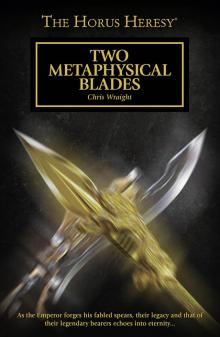 Two Metaphysical Blades
Two Metaphysical Blades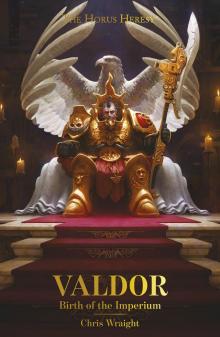 Valdor: Birth of the Imperium
Valdor: Birth of the Imperium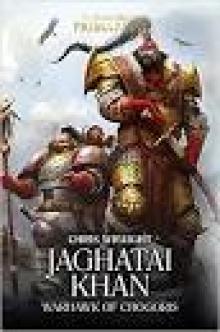 JAGHATAI KHAN WARHAWK OF CHOGORIS
JAGHATAI KHAN WARHAWK OF CHOGORIS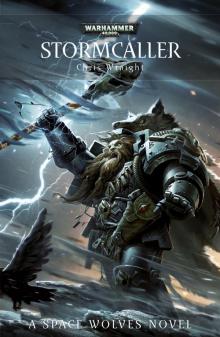 Stormcaller
Stormcaller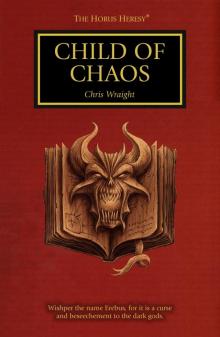 Child of Chaos
Child of Chaos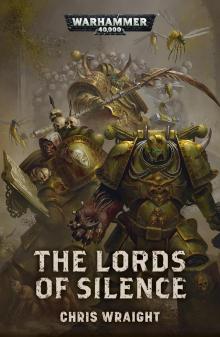 The Lords of Silence
The Lords of Silence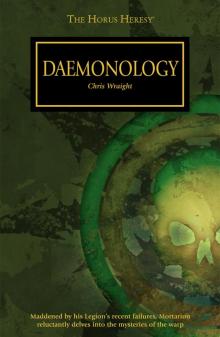 Daemonology
Daemonology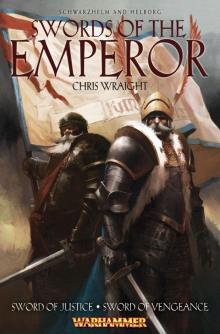 Swords of the Emperor
Swords of the Emperor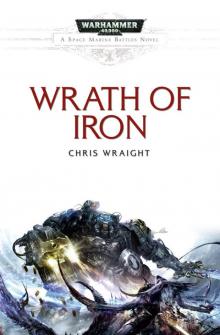 Wrath of Iron
Wrath of Iron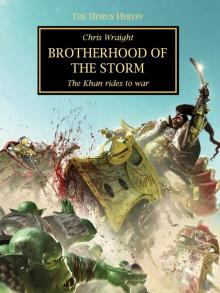 Brothers of the Storm
Brothers of the Storm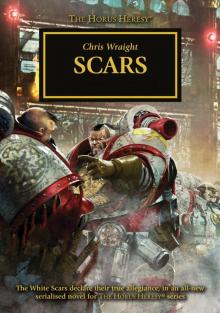 Horus Heresy: Scars
Horus Heresy: Scars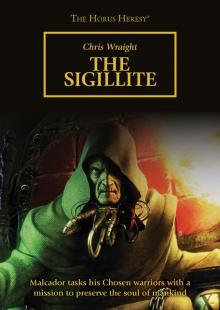 The Sigillite
The Sigillite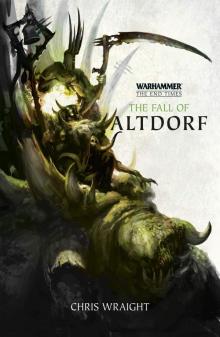 The End Times | The Fall of Altdorf
The End Times | The Fall of Altdorf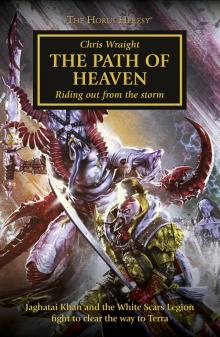 The Path of Heaven
The Path of Heaven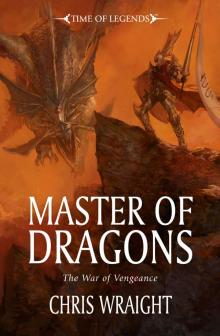 Master of Dragons
Master of Dragons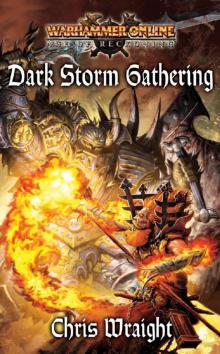 WH-Warhammer Online-Age of Reckoning 02(R)-Dark Storm Gathering
WH-Warhammer Online-Age of Reckoning 02(R)-Dark Storm Gathering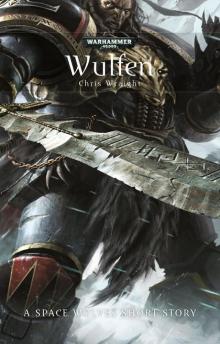 Wulfen
Wulfen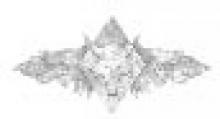 Battle Of The Fang
Battle Of The Fang Onyx
Onyx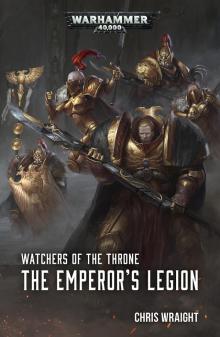 Watchers of the Throne: The Emperor’s Legion
Watchers of the Throne: The Emperor’s Legion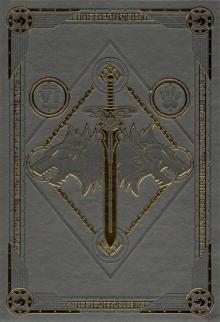 Leman Russ: The Great Wolf
Leman Russ: The Great Wolf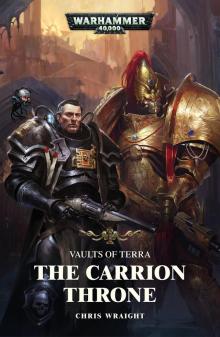 Vaults of Terra: The Carrion Throne
Vaults of Terra: The Carrion Throne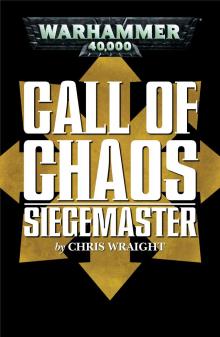 Siegemaster
Siegemaster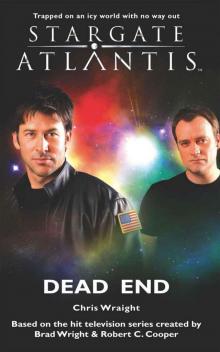 STARGATE ATLANTIS: Dead End
STARGATE ATLANTIS: Dead End Scars
Scars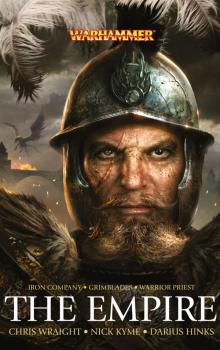 The Empire Omnibus
The Empire Omnibus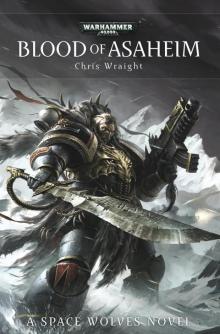 Blood of Asaheim
Blood of Asaheim